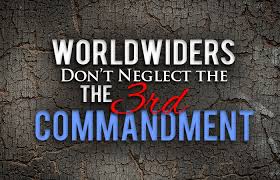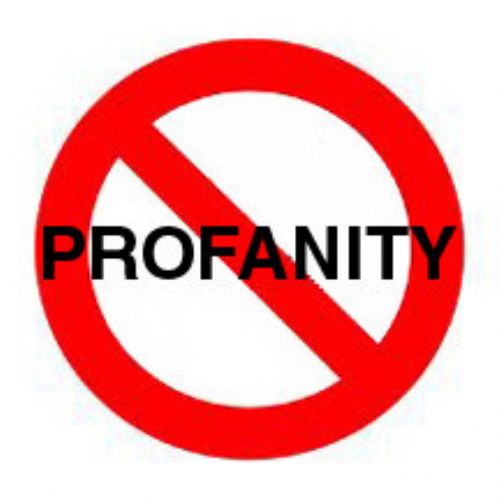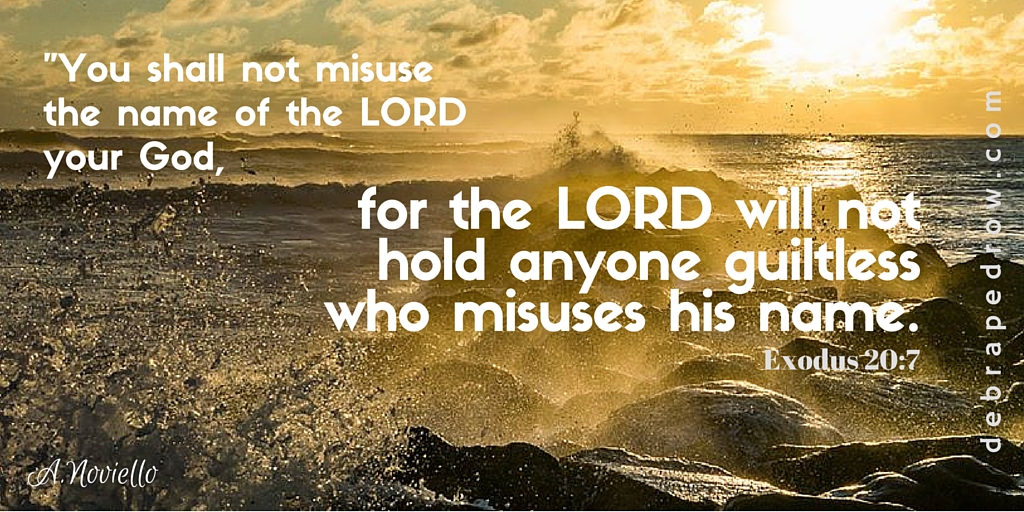The Ten Commandments are the base commands of God’s moral Law. These commandments were handed down to the Israelites as a guide on how to live righteously as God’s chosen people. However, as Moses descended from the mountain with the stone tablets containing the laws, the Israelites had already broken the first two commandments. Fortunately, Moses got to the bottom before they broke the 3rd commandment. However, as time went on, Israel broke all of God’s commandments. Is it any different today?
What is the 3rd Commandment?
The third commandment is found in Ex. 20:7, which reads:
7 Thou shalt not take the name of the Lord thy God in vain; for the Lord will not hold him guiltless that taketh his name in vain.
What does it mean to take the Lord’s name in vain?
The NIV translation reads, “You shall not misuse the name of the Lord your God….” The Hebrew word translated as vain is “shav,” which means pointlessly, using figuratively or foolishly, deceitfully, and flippantly. It means using God’s name in a thoughtless and insincere way. This third Commandment is a commandment that is universally disregarded by humanity.
In earlier times, the most common practice was to use God’s name in profanity slang, such as “it just a god**** shame.” In fact, in one church bulletin addressing this profane vernacular, it read, “God’s last name is not damn.”
But you don’t’ hear much of that these days. We have progressed—or have we? These days we have more insidious ways of using the Lord’s name in vain. For starters, we say, “oh my God!”
So, is it wrong to call on God’s name? After all the Scriptures read in Acts 2:21, “And it shall come to pass, that whosoever shall call on the name of the Lord shall be saved.” In addition, in Ps. 50:15, God is quoted as saying, “And call upon me in the day of trouble: I will deliver thee, and thou shalt glorify me.” As well as Ps 91:15, “He shall call upon me, and I will answer him: I will be with him in trouble; I will deliver him, and honour him.”
Lastly, Jer. 29:12, “Then shall ye call upon me, and ye shall go and pray unto me, and I will hearken unto you.”
It is apparent that the Lord wants His people to call upon Him. The problem is when we call on His name not to be saved or in a day of trouble, but merely as a figure of speech.
If a dollar was donated every time, someone used the expression “oh my God,” there would be a lot fewer homeless people on the streets. It is incredible how far we have departed from the Commandments of God.
Anytime someone is excited, shocked, surprised, dismayed, or even angered about something, the first thing out of the mouth is, “oh my God!” Even more incredible is professing Christians are engaging this very practice.
In our tech-savvy world, we have gone generic with OMG. In the realm of text and instant messaging, social media, etc., it has become a prevalent  means for expressing surprise or astonishment. OMG can represent several things such as oh my God, oh my goodness, or oh my gosh.
means for expressing surprise or astonishment. OMG can represent several things such as oh my God, oh my goodness, or oh my gosh.
This acronym is used in all sorts of secular venues: from Pop music to dolls. For example, a hit song is actually entitled, “Oh my God” which we danced to ignorantly!
The conventional wisdom says regarding OMG, it is not using the Lord’s name in vain because you’re not saying on my God. However, oh my God, is where it is derived. Even though it is watered down, it is not far enough away from God’s Commandment: “You shall not misuse the name of the Lord your God…” NIV There are no exceptions. Therefore, it is merely a weak excuse to have our way and another manifestation of a rebellious and narcissistic-selfish society.
In the post-modern society we live in today, everything is subjective: even using the Lord’s name in vain. If an individual feels that it is ok, so be it. And yet we ask, what is happening to America?
When we speak God’s name, it is at all times to be in a respectful and reverent way. God’s name is in no way to be used in any irreverent way whatsoever.
Below are all the little sayings that use God’s name in an irreverent or careless way that are wrong:
| ⇒ God Almighty
⇒ Sweet Jesus ⇒ Lord have mercy ⇒ Oh God ⇒ The man upstairs ⇒ Somebody up |
⇒ God damn
⇒ God or Jesus Christ or Christ (by themselves, when spoken carelessly) |
Why must we play with the name of God? Aren’t there enough words in the dictionary to express our excitement, dismay, or anger?
How we use God’s name and treat God’s name is of crucial concern to Him. He is the great Creator, the Sovereign LORD and Majesty, the Supreme Ruler and Judge of the universe. Therefore, His name must always be honored, praised, and worshipped. Because of His person and who He is, God demands and insists that we never, not ever, misuse His name.
Therefore:
- we must never curse nor abuse His name.
- We must never use His name in a frivolous or insincere way.
- We must never take the name of the LORD God in vain.
This commandment is directed to every human being upon the earth. There is no room for subjectivity.
No individual of any age group or time of history, as long as God lives, as

long as God exists, from eternity past to eternity future, is to misuse or take God’s name in vain. This is what God demands; one of the ways we are to connect to God is by reverencing His Name. This commandment will be in force as long as we live and as long as God exists—forever.
This commandment has an even broader spectrum. There are other ways an individual can misuse God’s name or take God’s name in vain. This commandment forbids profanity.
Profanity is the cursing, abusive, bitter, profane use of God’s name or any of God’s design. By design is meant everything within the universe. Therefore, taking God’s name in vain, misusing God’s name involves all uses of vulgarity and profanity: foul, distasteful slang words, and even words such as damn, hell, darn, and other such negative terms.
What do these kinds of words have to do with misusing God’s name? To put it simply, when we use profanity, we are profaning and cursing a part of creation. No individual has the right to profane and curse or condemn anything in God’s creation. We must never forget this one fact: The earth is the Lord’s, and He alone is the great Creator and Sustainer of everything within the universe. Therefore, to profane or curse anything in creation is to take God’s name in vain. It is destructive, totally senseless, and worthless.
Scripture, God’s Word, further confirms the distastefulness of profanity. Col 3:6-9
6 Because of these, the wrath of God is coming. 7 You used to walk in these ways, in the life you once lived. 8 But now you must rid yourselves of all such things as these: anger, rage, malice, slander, and
filthy language from your lips. NIV
In this passage, Paul was reminding the Colossian Christians that they  should no longer engage in the things they practiced before becoming Christians, including “filthy language.”
should no longer engage in the things they practiced before becoming Christians, including “filthy language.”
Eph 4:29
29 Don’t use foul or abusive language. Let everything you say be good and helpful, so that your words will be an encouragement to those who hear them.
Here again, Paul is addressing Christian Behavior. This time it is to the Christians in Ephesus. God’s people are not to use “foul or abusive language.”
What are the Consequences?

The Commandment ends with, “…for the Lord will not hold anyone guiltless who misuses his name.”
It is pretty clear that judgment is the consequence. Judgment is the result of profanity. Yet, in our society, people excuse profanity as being therapeutic for agitated and angered spirits. However, that is a deception from the enemy. That perverted thinking will not hold up in court with God. On the contrary, it will only make the judgment for profanity more severe.
Profanity is like a storm, a terrible, terrifying disturbance that is devastating and completely senseless and worthless. Profanity is a pervasive sin that is blanketing our nation and the world today. Profanity is swiftly becoming so acceptable that it is a part of everyday conversation. The horrendous spiritual peril of profanity has been forgotten. The danger is tragically ignored and even denied. Even so, it is a definite threat: profanity is a creeping paralysis:
- that devastates the foundation of respect between individuals, especially between the citizens of a diverse society and nation.
- that wipes out the moral strength and esteem of individuals for one another and their nation.
- that corrupts the language of a nation and people
- that annihilates the ability of citizens to continue to grow, build, advance, enhance, enlarge, and increase the quality of their lives, society, and nation.
Profanity will destroy a nation by corrupting the language and respect of people for one another. Over time, profanity will attack and destroy everything held dear by society.
The bottom line is this: we must not use vulgarity, must not misuse God’s name for a terrifying reason: because the LORD holds us accountable if we misuse His name. The word “guiltless”
(waqah) denotes that God will not deem us clear or free from blame. He will not consider us clean or pure, innocent or “guiltless.” God will not acquit us or not let us go unpunished.
Here is why: Psalm 139:20
20 For they speak against thee wickedly, and thine enemies take thy name in vain.
Note what the Scripture says: the person who curses and misuses God’s name stands as an enemy of God. A man may curse God or swear untruthfully to his wife or neighbor or even a jury, and he may not be corrected or punished. However, God will know that the man cursed His name or lied, and Scripture is clear: God will rebuke him. God will punish the individual who insulted His great and glorious name.
It is interesting how both Christian and non-Christian individuals focus on a few commandments and disregard others. Such as, thou shalt not: lie, steal, commit adultery, and bear false witness. It is good to obey those. However, it is crucial to fully understand that all of God’s Commandments are to be obeyed. Not obeying just one commandment makes an individual a total lawbreaker. Scripture says in James 2:10-11, “ For the person who keeps all of the laws except one is as guilty as a person who has broken all of God’s laws. 11 For the same God who said, “You must not commit adultery,” also said, “You must not murder.” So if you murder someone but do not commit adultery, you have still broken the law.” NLT
There are no shortcuts to obeying God. Therefore, we must obey the commandment of controlling our speech and not use God’s name in vain. This includes His Son, Jesus, whose name is just as great. Scripture says in Phil 2:9-12:
9 Wherefore God also hath highly exalted him, and given him a name which is above every name:
10 That at the name of Jesus every knee should bow, of things in heaven, and things in earth, and things under the earth;
11 And that every tongue should confess that Jesus Christ is Lord, to the glory of God the Father.
By honoring and glorifying the Son, we honor and glorify the Father. Therefore, it behooves us to control our speech along with the other areas of our lives.
Amen
All questions, comments, and concerns may be left below. You will receive a response.
Blessings!
Greetings! You shared an important article ever. I must say that I totally agree with you that we use ‘Oh my God” more times than it necessarily needs to be. I have learned today that this is absolutely wrong and it means we misuse God’s name. Thanks for sharing this article with us, it really brought some light to me and I will be sharing it further too.
Greetings Kokontals – I am happy to know that the article has enlightened you and that you’ll be sharing it with others. Sometimes we say and do things unwittingly. But as I like to say, when we know better, we do better. That is how we grow.
Thanks for commenting!
Words only have the power that people give them, so I find that a commandment to not take the lords name in vain only serves as another way to subject followers into blind obedience and submission. What about the other “swear words”? How would those even defined as they vary greatly by culture? Words and being offended by them are completely subjective to the listener.
So you feel that obeying the Lord’s Commandments is blind obedience and submission? How interesting!
As far as the other “swear words” you mentioned, the Scriptures are pretty clear about those as well. You might want to take a peek sometime.
The subjective nature you alluded to is what has caused so much confusion in the cultures these days. Isn’t it interesting that the world is becoming more and more subjective, yet God is still objective? How long do you think that is going to work?
Reality and truth can only be subverted for so long before they work their way back with a consequence for their denial. Beware!
Thanks for commenting!